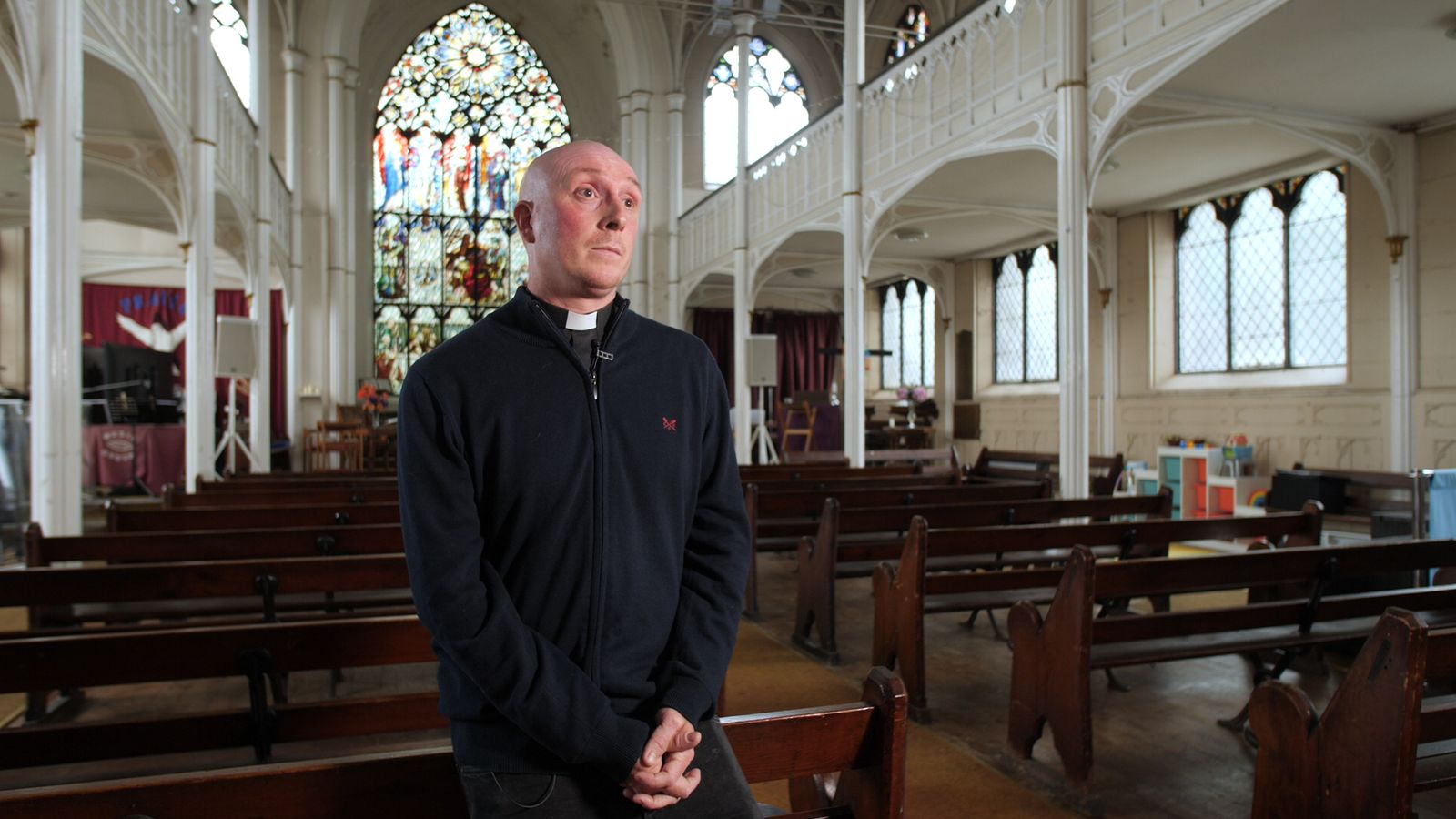A church is considering restricting when it holds funerals in a bid to save money as heating costs have more than doubled since April, according to its vicar.
Reverend Adam Maynard, of St George’s in Liverpool, has told Sky News he is looking at carrying out the services when there are other events planned so the heating is already on.
The heating, the lights, the sound system – they all cost money and he is having to think about drastic measures.
Rev Maynard said he was “in shock” when the church treasurer told him how much the bills had risen.
He added: “With heating bills being so high, we’re going to have to think really carefully about how we arrange things like funerals.
“So for instance, are we going to have to try and make sure we’re arranging funerals when other things are happening in the church?
“Having funerals around those times or just before or after those other things – so the heating is already on and therefore saving money – rather than the days when nothing is happening in the church and to turn the heating on would be really, really expensive.”
Family of Olivia Pratt-Korbel appeal for help to find out ‘who took our baby away from us’
Olivia Pratt-Korbel live updates: Family’s tribute to ‘chatty, nosey little girl’ – as police concede gunman may have fled abroad
Scientists create ‘synthetic’ mouse embryos that went on to develop a brain, nerve cord and beating heart tissue
St George’s – which was the first iron-framed church in the world and is more than 200 years old – is not easy to keep warm.
“We have faith, we will continue to offer that, but we will be looking more closely at the bills as we do it.”
Please use Chrome browser for a more accessible video player
The church is in one of the most deprived parishes in England – and they don’t want to pass on increased energy costs to the community.
Adam’s wife, Naomi, is the Good Food Programme director at Feeding Liverpool – which connects organisations in the city concerned with food.
St George’s offers a food pantry once a week and Naomi is passionate about what else they’d like to offer – but can’t because of worries about soaring energy costs.
One idea being talked about as Britain moves towards the cold and dark of autumn and winter is so-called ‘heat banks’- or places where people can go to warm up and meet others to share a tea or coffee.
Naomi said: “The Church of England would naturally want to be on the frontline of offering this. But the reality facing many churches in old buildings is we just can’t afford to do this.
“We can’t be there in the way we want to be this winter without the finances to do that.”
Across Liverpool, we visit another food pantry in Fazakerley.
A few months ago, we first reported on food banks running short of food. That now appears to be widespread.
The new trend – driven by soaring energy costs – is people wanting food they don’t have to cook.
Food co-ordinator Julie Addy told us that people’s habits have changed and energy prices are having a “massive” impact on what they’re choosing at the food pantry.
She said: “People pick up biscuits because it’s something to eat rather than something to cook. They haven’t got the fuel.
“People want quick hits because basically, they can’t afford to cook it because of energy prices.”
“If an appliance breaks, they’ve got no way of getting a new appliance. It sounds mad but if your microwave’s bust, how do you cook that meal? People are putting things together to cook it together to save energy.”
Dire situation like ‘Victorian times’
Julie likens what she sees to “Victorian times”.
She said: “It really saddens you. It’s disgraceful. It’s like living in Dickensian Britain, it’s like Victorian times. We shouldn’t be living like this and people will die.”
It’s 80-year-old Olma Baden’s first time in the food bank.
She tells me that she finds it “demeaning”.
She said: “This is the very first time. I never thought I would have to resort to this.”
Olma is not only angry but also defiant when it comes to energy costs.
She said: “I am prepared to march with anyone holding the banners. Something’s got to be done about it. I wouldn’t pay them (energy bills) even if I could afford to because I think it’s wicked and wrong what’s going on.”
Olma said she’s not afraid of bailiffs.
She said: “Whether I’ll take it as far as going to prison is a different matter. They can’t possibly jail us all. But I’d take it as far as I possibly could.”






















